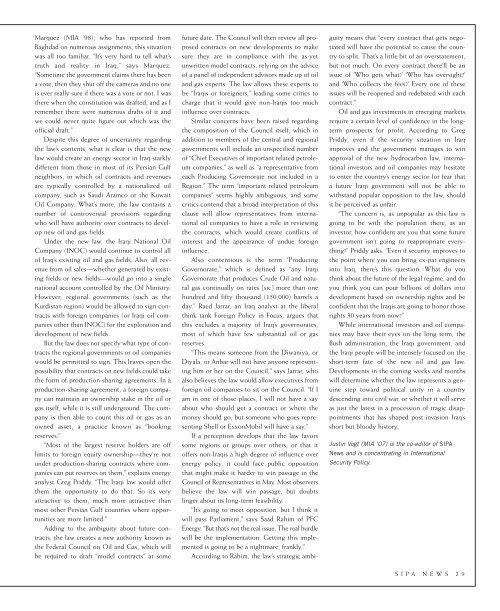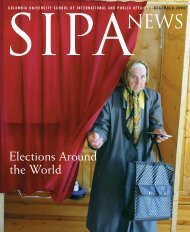The Energy Issue - School of International and Public Affairs ...
The Energy Issue - School of International and Public Affairs ...
The Energy Issue - School of International and Public Affairs ...
Create successful ePaper yourself
Turn your PDF publications into a flip-book with our unique Google optimized e-Paper software.
Marquez (MIA ’98), who has reported from<br />
Baghdad on numerous assignments, this situation<br />
was all too familiar. “It’s very hard to tell what’s<br />
truth <strong>and</strong> reality in Iraq,” says Marquez.<br />
“Sometime the government claims there has been<br />
a vote, then they shut <strong>of</strong>f the cameras <strong>and</strong> no one<br />
is ever really sure if there was a vote or not. I was<br />
there when the constitution was drafted, <strong>and</strong> as I<br />
remember there were numerous drafts <strong>of</strong> it <strong>and</strong><br />
we could never quite figure out which was the<br />
<strong>of</strong>ficial draft.”<br />
Despite this degree <strong>of</strong> uncertainty regarding<br />
the law’s contents, what is clear is that the new<br />
law would create an energy sector in Iraq starkly<br />
different from those in most <strong>of</strong> its Persian Gulf<br />
neighbors, in which oil contracts <strong>and</strong> revenues<br />
are typically controlled by a nationalized oil<br />
company, such as Saudi Aramco or the Kuwait<br />
Oil Company. What’s more, the law contains a<br />
number <strong>of</strong> controversial provisions regarding<br />
who will have authority over contracts to develop<br />
new oil <strong>and</strong> gas fields.<br />
Under the new law, the Iraqi National Oil<br />
Company (INOC) would continue to control all<br />
<strong>of</strong> Iraq’s existing oil <strong>and</strong> gas fields. Also, all revenue<br />
from oil sales—whether generated by existing<br />
fields or new fields—would go into a single<br />
national account controlled by the Oil Ministry.<br />
However, regional governments (such as the<br />
Kurdistan region) would be allowed to sign contracts<br />
with foreign companies (or Iraqi oil companies<br />
other than INOC) for the exploration <strong>and</strong><br />
development <strong>of</strong> new fields.<br />
But the law does not specify what type <strong>of</strong> contracts<br />
the regional governments or oil companies<br />
would be permitted to sign. This leaves open the<br />
possibility that contracts on new fields could take<br />
the form <strong>of</strong> production-sharing agreements. In a<br />
production-sharing agreement, a foreign company<br />
can maintain an ownership stake in the oil or<br />
gas itself, while it is still underground. <strong>The</strong> company<br />
is then able to count this oil or gas as an<br />
owned asset, a practice known as “booking<br />
reserves.”<br />
“Most <strong>of</strong> the largest reserve holders are <strong>of</strong>f<br />
limits to foreign equity ownership—they’re not<br />
under production-sharing contracts where companies<br />
can put reserves on them,” explains energy<br />
analyst Greg Priddy. “<strong>The</strong> Iraqi law would <strong>of</strong>fer<br />
them the opportunity to do that. So it’s very<br />
attractive to them, much more attractive than<br />
most other Persian Gulf countries where opportunities<br />
are more limited.”<br />
Adding to the ambiguity about future contracts,<br />
the law creates a new authority known as<br />
the Federal Council on Oil <strong>and</strong> Gas, which will<br />
be required to draft “model contracts” at some<br />
future date. <strong>The</strong> Council will then review all proposed<br />
contracts on new developments to make<br />
sure they are in compliance with the as-yet<br />
unwritten model contracts, relying on the advice<br />
<strong>of</strong> a panel <strong>of</strong> independent advisors made up <strong>of</strong> oil<br />
<strong>and</strong> gas experts. <strong>The</strong> law allows these experts to<br />
be “Iraqis or foreigners,” leading some critics to<br />
charge that it would give non-Iraqis too much<br />
influence over contracts.<br />
Similar concerns have been raised regarding<br />
the composition <strong>of</strong> the Council itself, which in<br />
addition to members <strong>of</strong> the central <strong>and</strong> regional<br />
governments will include an unspecified number<br />
<strong>of</strong> “Chief Executives <strong>of</strong> important related petroleum<br />
companies,” as well as “a representative from<br />
each Producing Governorate not included in a<br />
Region.” <strong>The</strong> term “important related petroleum<br />
companies” seems highly ambiguous, <strong>and</strong> some<br />
critics contend that a broad interpretation <strong>of</strong> this<br />
clause will allow representatives from international<br />
oil companies to have a role in reviewing<br />
the contracts, which would create conflicts <strong>of</strong><br />
interest <strong>and</strong> the appearance <strong>of</strong> undue foreign<br />
influence.<br />
Also contentious is the term “Producing<br />
Governorate,” which is defined as “any Iraqi<br />
Governorate that produces Crude Oil <strong>and</strong> natural<br />
gas continually on rates [sic] more than one<br />
hundred <strong>and</strong> fifty thous<strong>and</strong> (150,000) barrels a<br />
day.” Raed Jarrar, an Iraq analyst at the liberal<br />
think tank Foreign Policy in Focus, argues that<br />
this excludes a majority <strong>of</strong> Iraq’s governorates,<br />
most <strong>of</strong> which have few substantial oil or gas<br />
reserves.<br />
“This means someone from the Diwaniya, or<br />
Diyala, or Anbar will not have anyone representing<br />
him or her on the Council,” says Jarrar, who<br />
also believes the law would allow executives from<br />
foreign oil companies to sit on the Council. “If I<br />
am in one <strong>of</strong> those places, I will not have a say<br />
about who should get a contract or where the<br />
money should go, but someone who goes representing<br />
Shell or ExxonMobil will have a say.”<br />
If a perception develops that the law favors<br />
some regions or groups over others, or that it<br />
<strong>of</strong>fers non-Iraqis a high degree <strong>of</strong> influence over<br />
energy policy, it could face public opposition<br />
that might make it harder to win passage in the<br />
Council <strong>of</strong> Representatives in May. Most observers<br />
believe the law will win passage, but doubts<br />
linger about its long-term feasibility.<br />
“It’s going to meet opposition, but I think it<br />
will pass Parliament,” says Saad Rahim <strong>of</strong> PFC<br />
<strong>Energy</strong>. “But that’s not the real issue. <strong>The</strong> real hurdle<br />
will be the implementation. Getting this implemented<br />
is going to be a nightmare, frankly.”<br />
According to Rahim, the law’s strategic ambiguity<br />
means that “every contract that gets negotiated<br />
will have the potential to cause the country<br />
to split. That’s a little bit <strong>of</strong> an overstatement,<br />
but not much. On every contract there’ll be an<br />
issue <strong>of</strong> ‘Who gets what?’ ‘Who has oversight?’<br />
<strong>and</strong> ‘Who collects the fees?’ Every one <strong>of</strong> these<br />
issues will be reopened <strong>and</strong> redebated with each<br />
contract.”<br />
Oil <strong>and</strong> gas investments in emerging markets<br />
require a certain level <strong>of</strong> confidence in the longterm<br />
prospects for pr<strong>of</strong>it. According to Greg<br />
Priddy, even if the security situation in Iraq<br />
improves <strong>and</strong> the government manages to win<br />
approval <strong>of</strong> the new hydrocarbon law, international<br />
investors <strong>and</strong> oil companies may hesitate<br />
to enter the country’s energy sector for fear that<br />
a future Iraqi government will not be able to<br />
withst<strong>and</strong> popular opposition to the law, should<br />
it be perceived as unfair.<br />
“<strong>The</strong> concern is, as unpopular as this law is<br />
going to be with the population there, as an<br />
investor, how confident are you that some future<br />
government isn’t going to reappropriate everything?”<br />
Priddy asks. “Even if security improves to<br />
the point where you can bring ex-pat engineers<br />
into Iraq, there’s this question: What do you<br />
think about the future <strong>of</strong> the legal regime, <strong>and</strong> do<br />
you think you can pour billions <strong>of</strong> dollars into<br />
development based on ownership rights <strong>and</strong> be<br />
confident that the Iraqis are going to honor those<br />
rights 30 years from now?”<br />
While international investors <strong>and</strong> oil companies<br />
may have their eyes on the long term, the<br />
Bush administration, the Iraqi government, <strong>and</strong><br />
the Iraqi people will be intensely focused on the<br />
short-term fate <strong>of</strong> the new oil <strong>and</strong> gas law.<br />
Developments in the coming weeks <strong>and</strong> months<br />
will determine whether the law represents a genuine<br />
step toward political unity in a country<br />
descending into civil war, or whether it will serve<br />
as just the latest in a procession <strong>of</strong> tragic disappointments<br />
that has shaped post-invasion Iraq’s<br />
short but bloody history.<br />
Justin Vogt (MIA ’07) is the co-editor <strong>of</strong> SIPA<br />
News <strong>and</strong> is concentrating in <strong>International</strong><br />
Security Policy.<br />
SIPA NEWS 29

















